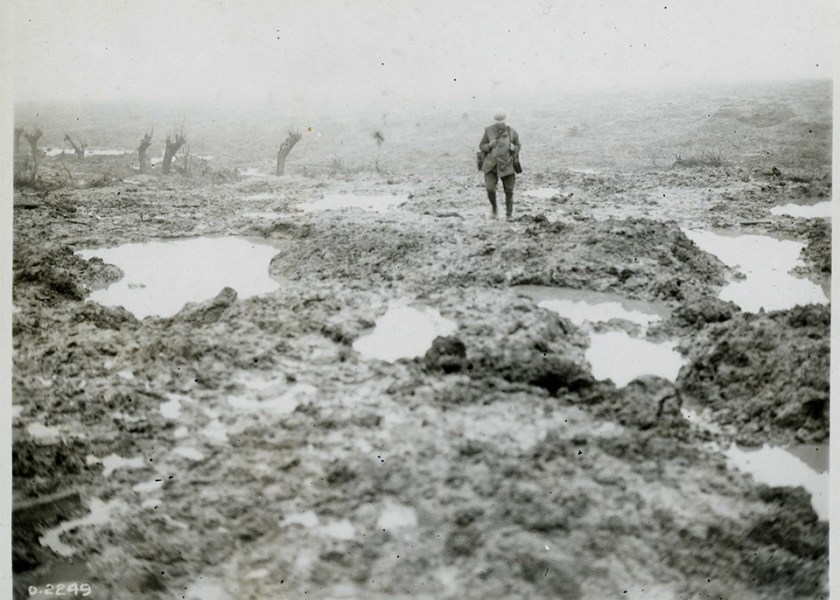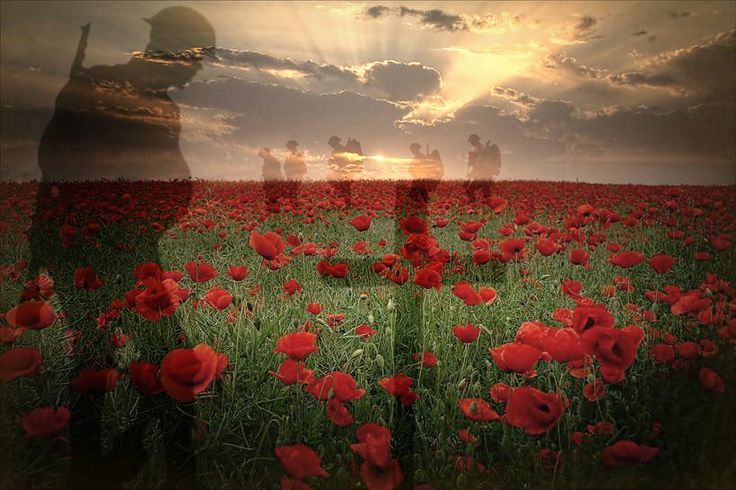November 11. Veteran’s Day. A federal holiday in the United States, set aside to honor those who have served in the US Armed Forces. The Commonwealth nations call it Remembrance Day and sometimes Poppy Day, harking back to the tradition of the Remembrance Poppy. Once, it was simply “Armistice Day”. The end of the “Great War”. Before they had numbers.

There is barely a piece of 20th century history that can’t be traced back to World War One, the “War to end all Wars”.
International Communism was borne of the Great War, without which there would have been no cold war, no Korean War, no war in Vietnam. The killing fields of Cambodia would have remained, mere rice fields. The spiritual descendants of Chiang Kai-shek’s brand of capitalism would be running all of China, instead of only Taiwan.

The current proportions of the Middle East arose from the Great War. While tribal alliances and religious strife are nothing new in that region, those conditions would have taken a different form, had it not been for those boundaries.

Ypres. The aftermath. Stop for a moment if you will, and imagine. What this felt like. What this smelled like. What this looked like. In color.
There were five such battles for the Ypres salient, of WW1
World War II, an apocalypse which left more dead, wounded or missing than any conflict in world history, was little more than the Great War, part II. A Marshall of France, on reading the Versailles Treaty formally ending WWI, said “This isn’t peace. This is a cease-fire that will last for 20 years”. He was off, by about 36 days.

It’s hard to understand how a participating citizen of a self-governing Republic, can function without some understanding of our own history. We can’t know where we want our nation to go, if we don’t understand where it’s been. It’s one of the principle reasons for examining history. It’s why I think something wonderful happened just a few years ago, and I don’t think many of us heard about it.
Over the summer of 2013, more than 1,000 British and Belgian schoolchildren visited 70 battlefields of the Great War. Ypres. Passchendaele. Verdun. The Somme. It was a singular event. Never before had the Commonwealth War Graves Commission permitted excavation on Any of these battlefields.
All over Northern France and Belgium, the region known as “Flanders”. There these children collected samples of the sacred soil of those fields of conflict.

No ordinary dirt, the soil of Flanders Fields is literally infused with the essence of those who fought and died there. The soil from those seventy battlefields was placed in as many WWI-style burlap sandbags, each stenciled with a red poppy, where it came from, and the dates.
A hundred-odd years ago, countless British and Commonwealth soldiers passed through the Menenpoort, the Menin Gate in the Belgian city of Ypres. Some 300,000 gave their lives in defense of the “Ypres Salient” of WW1. Some 90,000 of those, have no known graves.

With a solemn Armistice Day ceremony at the Menin Gate, those 70 sandbags began their journey.
The sacred soil of Flanders Fields was transported to London aboard the Belgian Navy frigate Louisa Marie and installed with great care at Wellington Barracks, the central London home of the Grenadier Guards, Coldstream Guards and Scots Guards.
There the soil of the Great War would nourish and support a simple garden. It was all in preparation for the following year, 2014 and the solemn remembrance of the centenary, of the War to end all Wars.

I cannot think of anything more fitting than that it was children, our future and posterity, who retrieved the sacred soil of Flanders and installed it in that garden. A grassy mound, surrounded by the native trees of Flanders and inscribed with a poem by Dr. John McCrea, the 41-year-old Canadian physician who could have joined the medical corps based on his age and training. He volunteered instead to join a fighting unit, as gunner and medical officer.
His poem is called, “In Flanders Fields”.

In Flanders Fields, by Dr. John McCrae
In Flanders fields the poppies blow
Between the crosses, row on row,
That mark our place; and in the sky
The larks, still bravely singing, fly
Scarce heard amid the guns below.
We are the Dead. Short days ago
We lived, felt dawn, saw sunset glow,
Loved and were loved, and now we lie,
In Flanders fields.
Take up our quarrel with the foe:
To you from failing hands we throw
The torch; be yours to hold it high.
If ye break faith with us who die
We shall not sleep, though poppies grow
In Flanders fields.
It is now for that posterity to keep our history alive, never to let it fade into some sepia-toned and forgotten past.

Afterward
Moina Belle Michael was a professor at the University of Georgia. She took a leave of absence when the US entered the war in 1917 and accepted a job at the YMCA Overseas War Secretaries headquarters, in New York. Browsing through the Ladies Home Journal, she came across Dr. McCrae’s poem. It was Saturday morning, November 9, 1918. The war would be over in two days.
Dr. McCrae had succumbed to pneumonia by this time, while serving the No. 3 Canadian General Hospital (McGill), at Boulogne. He was buried with full military honors at the Wimereux cemetery where his gravestone lies flat, due to the sandy, unstable soil.
Professor Michael had seen McCrae’s poem before but it got to her this time, especially that last part:
“If ye break faith with us who die
We shall not sleep, though poppies grow
In Flanders fields”
Moina was so moved she made a personal pledge to “keep the faith”, vowing always to wear a red poppy, in remembrance of the dead. She scribbled down a response, a poem, on the back of a used envelope. She called it, “We Shall Keep the Faith”.
We Shall Keep the Faith

Oh! you who sleep in Flanders Fields,
Sleep sweet – to rise anew!
We caught the torch you threw
And holding high, we keep the Faith
With All who died.
We cherish, too, the poppy red
That grows on fields where valor led;
It seems to signal to the skies
That blood of heroes never dies,
But lends a luster to the red
Of the flower that blooms above the dead
In Flanders Fields




A moving, lovely tribute. I have stood in a lot of those places and it’s really humbling.
LikeLiked by 1 person
I would very much like to. Talk about bucket list.
LikeLiked by 1 person
Reblogged this on Dave Loves History.
LikeLiked by 1 person
Thank you for a beautiful post of remembrance. The garden- with the children gathering the soil- is a wonderful idea. Those physical reminders help the next generations to know that their history was real, tangible.
Your comment about not letting it fade into sepia-toned and forgotten past made me think- Have you come across the film “They Shall Not Grow Old?” For the 100th anniversary of WWI, Peter Jackson got a team together to restore and colorize WWI film footage, and it’s narrated by recordings of the actual veterans- it’s an extraordinary film, and seems like it might be up your alley.
LikeLiked by 1 person
Cheers, Anne. I hope you are well. I was having lunch with a buddy just yesterday and we were trying to remember the name of that film. Thank you for the reminder, I definitely want to watch that, I’d been looking for it, if only I could remember the name. And you’re right, I’ve always had a particular fascination with World War I. Not only because I believe it lead the way to virtually the entire history of the 20th century, but also for personal reasons. My paternal grandfather fought in the great war and was wounded, for which he earned a place in Arlington national cemetery. I take considerable pride in that.
LikeLiked by 1 person
Thanks- we’re doing pretty well over here. I hope you and yours are, too.
Glad to pass along the reminder- it’s an amazing film. The “making of” with it is just as interesting, in my opinion.
It’s amazing how history ties together- anyone who says history is dull is reading the wrong books!
My great-grandpa was an army cook in WWI. Family history says he cooked for the President’s daughter in France- whether it’s our president or another, and exactly how that all happened is an unknown.
LikeLiked by 1 person
I must tell you, the “naptime author” thing always put a big smile on my face.😀
LikeLiked by 1 person
Thank you. 🙂 Ahhh, if only they still napped… they just keep growing!
LikeLiked by 1 person
I just had my first grandbaby a few weeks ago. A little girl. I told a Mom & Dad. As soon as that little girl is big enough to handle a rod & reel, I’m taking her fishing.
LikeLiked by 1 person
Awww, congratulations!!!
LikeLiked by 1 person
🎣
LikeLiked by 1 person
Yes! Important Grandpa duties!
(My oldest two both started bawling when my dad got a fish on the line the first time. We need all the craziness to end so we can visit him and try again to toughen them up a little 😀 !)
LikeLiked by 1 person
😂 I have every intention of sending her home with an espresso, and a drum set.
LikeLiked by 1 person
…..as a Canadian, I am moved by this remarkable post, especially the children’s mission to bring home the soil of Flanders, and the recounting of the remarkable poem of Dr/Ms. Michael’s poetic reply to Dr. McRae’s.
LikeLiked by 1 person
The Somme. Vimy. Passchendaele. Canada’s “Hundred Days”. The Canadian soldier in WW1 had nothing to prove. To anyone.
LikeLiked by 1 person
….indeed, so. And yet, Canada cites WWI as the event which defined it as a nation among nations, where Canadians proved their metal and became a cohesive, identifiable people whose courage in adversity was demonstrated.
LikeLiked by 1 person